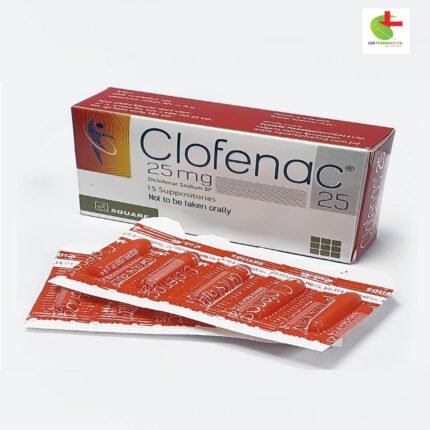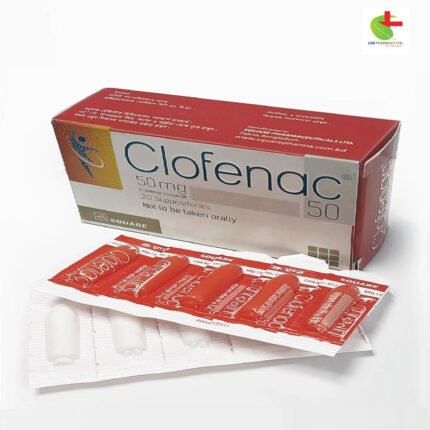Clofenac Suppository 12.5mg
12.00৳ Pcs
- Specializing in comprehensive solutions for diverse medical needs
- Offering a range of treatments for rheumatological, surgical, obstetrical, and dental conditions
- Featuring Diclofenac Sodium, a potent NSAID known for its anti-inflammatory and analgesic properties
- Tailored dosage options ensure effective relief for various ailments
- Committed to patient well-being and personalized care
 Brand
Brand
|
Square Pharmaceuticals PLC |
|---|---|
 Generics
Generics
|
Diclofenac Sodium |
 Type
Type
|
Suppository |
Indications
Rheumatology: Catering to inflammatory and degenerative forms of rheumatism, chronic involutive conditions, polyarthritis, ankylosing spondylarthritis, osteoarthritis, spondylarthroses, acute gout, and peri-articular rheumatic disorders.
Surgery and Traumatology: Offering relief for sprains, bruises, dislocations, fractures, soft tissue injuries, and post-surgical interventions.
Obstetrics and Gynecology: Providing solutions for primary dysmenorrhea, episiotomy, adnexitis, endometritis, parametritis, salpingitis, and mastitis.
Otorhinolaryngology: Administering pre-operative medication to prevent pain, inflammation, and swelling.
Dentistry: Supporting post-operative and post-traumatic pain management, as well as reducing inflammation and swelling.
Other Applications: Mitigating pain and inflammation for patients undergoing urogenital tract surgeries, experiencing renal and biliary colic.
Pharmacological Insights
Diclofenac Sodium stands as a potent non-steroidal anti-inflammatory drug (NSAID), renowned for its anti-rheumatic, anti-inflammatory, analgesic, and antipyretic properties. It also exhibits uricosuric effects. The mechanism of action involves the inhibition of prostaglandin biosynthesis, pivotal in inflammation, pain, and fever. Rapid and complete absorption from the gastrointestinal tract occurs, with peak plasma concentrations typically reached within two hours post-ingestion. Metabolism primarily occurs in the liver, undergoing first-pass metabolism.
Dosage & Administration Guidelines
Diclofenac FC Tablet: Recommended for adults at 75-150 mg daily in 2 to 3 divided doses, preferably after meals. Adjustments should be made for prolonged use.
Diclofenac SR Tablet: For adults, one tablet daily, swallowed whole with liquid, ideally during meals. Dosage may be increased to 150 mg daily if needed, supplemented with conventional tablets. Pediatric dosing is based on body weight.
Diclofenac Dispersible Tablet: Adults typically take 2-3 tablets daily, not exceeding 150 mg per day. In mild cases, 2 tablets suffice. Pediatric dosing is based on body weight, with the tablet dispersed in water before consumption.
Diclofenac TR Capsule: Recommended at one capsule daily, preferably after meals.
Diclofenac Suppository: For adults, 50 mg suppository usage 2-3 times daily, with a maximum daily dose of 150 mg.
Diclofenac Injection: Usual adult dose is 1 ampoule daily, with possible escalation to 2 ampoules daily in severe cases.
Diclofenac Gel: Exclusively for external use, applied 3-4 times daily as needed. Massage gently into affected areas.
Interactions
Diclofenac may interact with various medications, including lithium, digoxin, anticoagulants, antidiabetic agents, cyclosporin, methotrexate, quinolone antimicrobials, NSAIDs, and steroids. Caution is advised when co-administering these medications.
Contraindications
Patients hypersensitive to any ingredient should avoid use. Contraindicated in peptic ulcer cases and individuals with hypersensitivity to Diclofenac or other NSAIDs. Not recommended for asthmatic patients sensitive to acetylsalicylic acid or prostaglandin synthetase inhibitors. Avoid occlusive dressings with gel application.
Side Effects
Diclofenac is generally well tolerated, with rare and mild adverse effects including epigastric pain, eructation, nausea, diarrhea, dizziness, headache, peripheral edema, and skin reactions. Gel application may cause local irritation, reddening, or rash.
Pregnancy & Lactation
Use during pregnancy should be limited to compelling situations, with the lowest effective dose utilized. Avoid during the first trimester. Limited data suggest minimal transfer to breast milk without significant infant effects.
Precautions & Warnings
Monitor for peptic ulceration or gastrointestinal bleeding, especially in older patients. Avoid contact with eyes or mucous membranes with gel application. Practice proper hand hygiene post-application and refrain from oral consumption.
Therapeutic Class
Belongs to the categories of drugs for osteoarthritis, rheumatoid arthritis, and non-steroidal anti-inflammatory drugs (NSAIDs).
Storage Conditions
Store in a cool, dry place away from light, below 30°C, and out of children’s reach.













Reviews
There are no reviews yet.